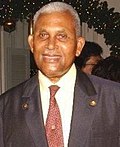16 December 1991 | |||||||||||||||||||||||||||||||||||||||||
All 36 seats in the House of Representatives 19 seats needed for a majority | |||||||||||||||||||||||||||||||||||||||||
|---|---|---|---|---|---|---|---|---|---|---|---|---|---|---|---|---|---|---|---|---|---|---|---|---|---|---|---|---|---|---|---|---|---|---|---|---|---|---|---|---|---|
| Turnout | 65.46% ( | ||||||||||||||||||||||||||||||||||||||||
| |||||||||||||||||||||||||||||||||||||||||
 Results by constituency | |||||||||||||||||||||||||||||||||||||||||
| |||||||||||||||||||||||||||||||||||||||||
General elections were held in Trinidad and Tobago on 16 December 1991. [1] The result was a victory for the People's National Movement, which won 21 of the 36 seats. Voter turnout was 65.5%. [2]


